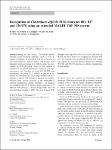Recognition of Clostridium difficile PCR-ribotypes 001, 027 and 126/078 using an extended MALDI-TOF MS system
Reil, M.
Erhard, M.
Kuijper, Ed J.
Kist, Manfred
Zaiß, Henning
Witte, Wolfgang
Gruber, H.
Borgmann, S.
During the last decade, Clostridium difficile infection (CDI) increased markedly inside as well as outside of hospitals. In association with the occurrence of new hypervirulent C. difficile strains, CDI became more important. Until now typing of C. difficile strains has been enabled by PCR-ribotyping. However, this method is restricted to specialized laboratories combined with high maintenance cost. Therefore, we tested MALDI-TOF mass spectrometry for typing of C. difficile to provide a fast method for surveillance of CDI. Using a standard set of 25 different C. difficile PCR ribotypes a database was made by different mass spectra recorded in the SARAMIS™ software (AnagnosTec, Zossen, Germany). The database was validated with 355 C. difficile strains belonging to 29 different PCR ribotypes collected prospectively from all submitted feces samples in 2009. The most frequent PCR ribotypes were type 001 (70%), 027 (4.8%) and 078/126 (4.7%). All three types were recognized by MALDI-TOF MS. We conclude that an extended MALDI-TOF system was capable to recognize specific markers for ribotypes 001, 027 and 078/126 allowing an effective identification of these strains.
No license information

